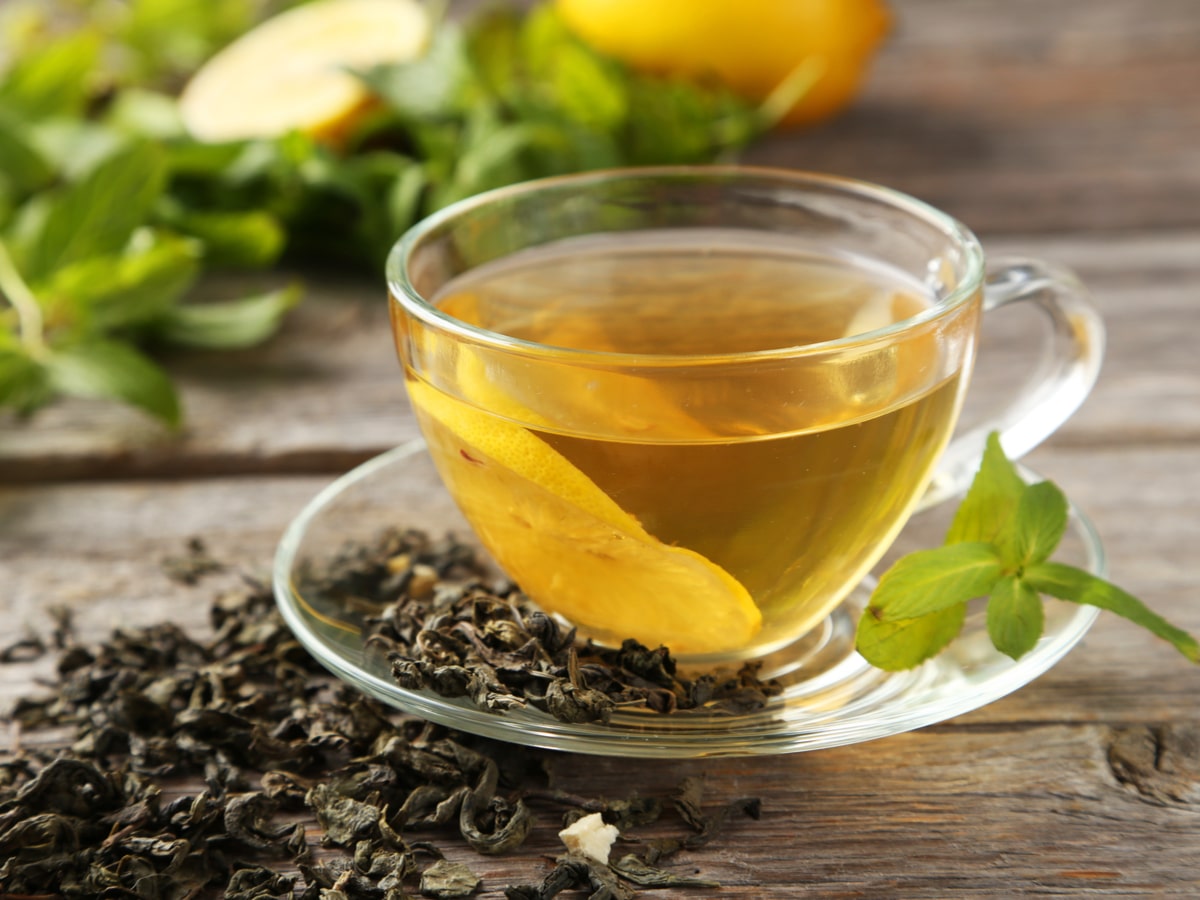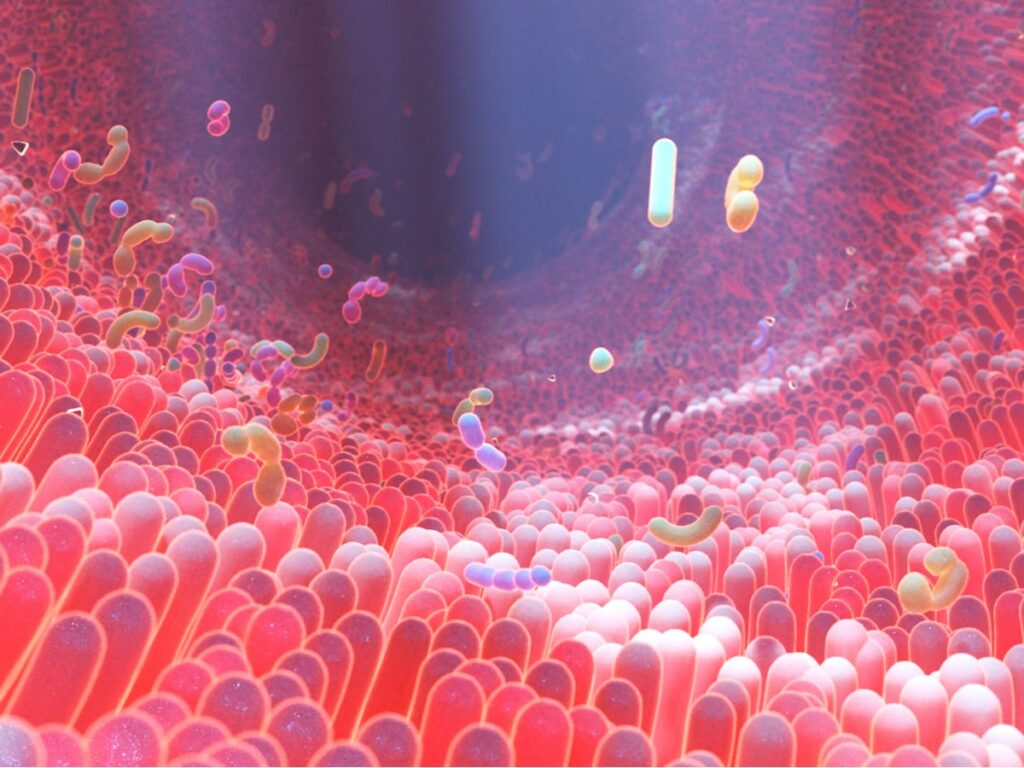
Green tea has been widely used in traditional Chinese medicine for over 3000 years for a wide range of health issues. More recently, green tea has been researching into the beneficial role in plays in gut health. [Source: Pubmed]
A question I’m often asked is: Does green tea help with bloating? Read on as we take take a closer look.
What is bloating?
Bloating is one of the most common symptoms of digestive dysfunction, especially in those with IBS. it has been estimated that up to 90% of those with IBS report bloating as a symptom.
It has also been estimated that if bloating is present, this is a predictor of severity of all IBS symptoms.
While there can be common approaches and underlying reasons for bloating, the process of resolving these issues varies between patients. This is partly due to the biological processes behind bloating being both complicated and incompletely understood.
The common definition of bloating is the sense of gassiness or a sense of being distended. [Source: NCBI]
Diagnosing Bloating
It’s important to keep in mind that distention is the visible inflation of the abdomen. Therefore, it is also possible for someone to feel bloating without looking distended.
Along with bloating (with or without distention) belching and burping can also occur. While these are also common in those with IBS it may or may not be directly related to the gas build up in the stomach. This can be attributed to swallowing of air during mealtimes.
Bloating is often diagnosed via the Rome III Criteria which are as follow:
- Recurrent feeling of bloating or visible distention for at least 3 days per month
- Onset of symptoms at least 6 months prior to diagnosis
- Presence of symptoms for at least 3 months
- Insufficient criteria to establish a diagnosis of irritable bowel syndrome, functional dyspepsia, or any other functional gastrointestinal disorder [Source: Pubmed]
What Causes Bloating?
While gas and bloating can result from multiple factors common underlying reasons for bloating include alteration in:
- Gas production
- Gut bacteria
- Intestinal transit time
- Intestinal propulsion of gas
- Nerve function [Source: Pubmed]
Gut Bacteria
The gut bacteria, also known as the gut microbiome in the term used to describe the microorganisms that colonise the intestinal tract.
These organisms are responsible for a wide range of function including immune balance, metabolism of drugs, health of the gut lining as well as the digestion of food.
Considering their role in the fermentation process, small alterations in the balance of these organisms may have the potential to lead to alteration in gas production which may contribute to bloating. [Source: NCBI]

Impaired Gas Transit
However, further research has indicated those with IBS do not actually produce more gas, but the amount of gas that is produced is not being transported along the gut appropriately.
This has been termed intestinal gas retention. [Source: Pubmed]
Abnormal Abdominal-Diaphragmatic Reflexes
There has also been investigation in the functioning and reflexed in the muscles in the abdominal walls.
In those without bloating or the presence of gas in the intestine increases the activity of the muscles in the abdominal wall. However, in those with bloating, the presence of gas actually leads to a relaxation of these muscles as well as the abdominal muscles.
This means that instead of contracting, the muscles relax which emphasises the presence of the gas leading in the visible distention. [Source: Gastrojournal]
Natural Approaches for Bloating
Due to the role the gut bacteria can play in bloating and distention probiotics are often used to support the gut microbiome.
Trails have indicated that specific strains of beneficial bacteria can lead to improvements in abdominal pain as well as bloating.
Does Green Tea Help Bloating?
Green tea has been widely researched for its role in many areas of health. This is believed to be through its various antioxidant and anti-inflammatory properties [Source: Pubmed]
Gut health is a specific area where it has received considerable research.
Many of the beneficial qualities are attributed to the polyphenols, in particular green tea flavonoids such as catechins, catechin gallates, and proanthocyanidins.
The specific actions of green tea may be complex but in essence, from a gut health perspective, there are 2 main actions of green tea.
- Stimulating the grown of beneficial bacteria
- Hindering the grown of less beneficial bacteria
This can be seen through research into green tea that indicates an increase is beneficial species such as Lactobacillus and Bifidobacterium and a reduction is pathogenic ones, such as Clostridium perfringens. [Source: MDPI]
Additionally, one of the key constituents of green tea, ECGC, has been shown to have antimicrobial properties [Source: NCBI]. This may be playing a key role in the balance of the gut microbiome, especially when there is dysbiosis (imbalance gut bacteria) that may be contributing to digestive symptoms such as bloating. [Source: NCBI]
Due to the effects of green tea to lower inflammation and support the composition of the gut microbiome this may be a help strategy to support overall gut health.
Green Tea and SIBO
SIBO (small intestinal bacterial overgrowth) is characterised by an elevation in bacteria in the small bowel. This often involves considerable bloating and distention.
Key organisms present in the overgrowth are
- E. coli
- Bacteroides spp.
- Clostridium spp
- Staphylococcus spp. [Source: Pubmed]
Green tea has been indicated to have action against all 4 of these. [Sources: Pubmed, Pubmed]
And while specific research is lacking green tea may be considered as part of a natural approach to address this issue.
How To Stop Stomach Bloating?
Bloating can be due to a number of factors, as outlined at the start of this article. These often include changes in gas production or gas transportation as well as alterations in muscle function in the abdominal region.
Natural approaches to addressing bloating include:
- Peppermint
- Artichoke
- St Johns Wort [Source: Pubmed]
- Probiotics [Source: Pubmed]
- Low FODMAP diet [Source: Pumbed]
How To Test for Bloating
Other areas may also need to be considered when looking to address bloating.
The following area may be particularly important to assess when this symptom of IBS is present.
| Aerophagia | Dietary Factors |
| Anorexia and bulimia | – Lactose Intolerance |
| Gastroparesis | – Fructose Intolerance |
| Gastric outlet obstruction (partial or complete) | – Fructan Consumption |
| Functional bloating | – Consumption of sorbitol or other nonabsorbable sugars |
| Functional dyspepsia | Small intestinal bacterial overgrowth (SIBO) |
| Celiac disease | Abnormal small intestinal motility (eg, scleroderma) |
| Chronic constipation | Small bowel diverticulosis |
| Irritable bowel syndrome | Evacuation disorders of the pelvic floor [Source: NCBI] |
| Carbohydrate intake | |
| Disturbances in colonic microflora | |
| Abnormal colonic transit |
As with all gut symptoms multiple factors may be involved however, testing can offer information to guide treatment.
To help you through this process you may like to contact a gut health practitioner to take some of the guess work out of your journey.






